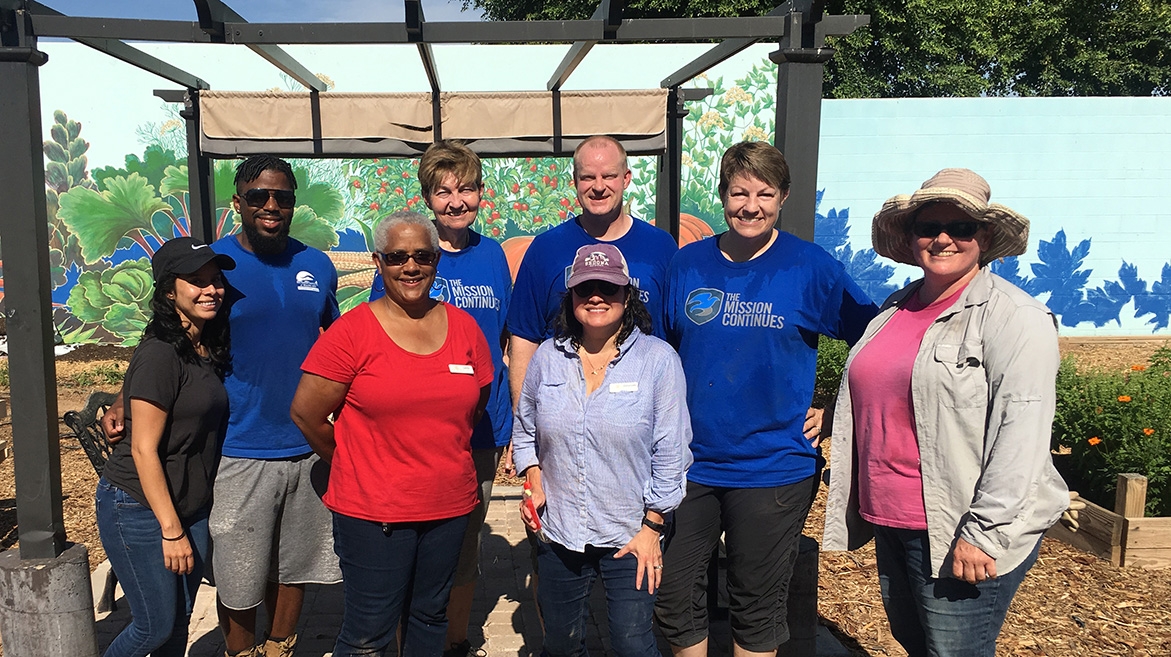
Newsroom

House of Refuge: Why certification as a Service Enterprise is "so worth your time"

January 23, 2020
House of Refuge, a Mesa-based nonprofit organization that provides safe, stable housing to families who are experiencing homelessness, was among the first organizations to complete the Service Enterprise Initiative (SEI) training with the ASU Lodestar Center. In September 2019, it became one of the first from that inaugural cohort to receive national certification from Points of Light.
SEI is a national program that provides training and certification to selected nonprofits that are committed to implementing exemplary volunteer management practices to achieve their missions. The Center works with the Arizona Governor's Office of Youth, Faith & Family and Points of Light to offer the program to area nonprofits.
Troy Hill, the Center's storyteller, talked with Hanna Smiddy from House of Refuge about the empowering SEI experience, what they've already put into practice, and why "it is just so worth your time."
Troy Hill, ASU Lodestar Center: What made your organization want to do the SEI program? And why is it important for your organization to grow in its volunteer interaction?
Hanna Smiddy, Community Outreach Specialist, House of Refuge: We're just continually seeking to grow and improve and we always welcome feedback and ideas from the volunteers that we have here, and SEI was just a way for us to take that to the next step and also further refine our skill set.
TH: Were there any specific instances that made you think you needed to improve in this area?
HS: I can think of one, this actually kind of goes in tandem with going through the SEI process. I had two separate conversations with volunteers about youth and the families that we had worked with… When I went in to talk to a volunteer, they're like, "I would love to help. I just don't know how to engage in those situations. I don't know how I can be helpful to this child." About 50 percent of the population that we serve are survivors of domestic violence, so that's going to come out in conversations, body language, tones of speech, vernacular.
So that being said, through SEI and updating our programming, we now require trauma-informed care for all of our volunteers. We've also seen a great amount of feedback, the first time that we had the training, and we had such a high turnout. There are multiple volunteers that come afterward, some not realizing it and just being like, “Wow, that was amazing. You should require that for all volunteers.” And it just reaffirms what our thoughts and intentions were behind having that training.
TH: Was there something from the training that really struck a chord with you? That you knew would definitely help you and your organization?
HS: Something that I knew was super helpful is, when approaching a situation, asking those questions for kids, getting down on their level, because I feel like if you're not around people that have a very diverse range of personalities, sometimes it can come as a bit of a shock to the system. We do have a diverse population that is on our campus, and if you haven't been in elementary or high school for a little while and you start to see some of these behaviors again, you're questioning, "Well, why are they running inside or throwing that?" and just recognizing that our main goal here is to be present for our families and to be supportive.
TH: What ideas has your organization implemented that it learned from SEI?
HS: Oh my goodness, there are so many things!
We now have volunteer service descriptions for each department so that way when a volunteer starts, they have a cheat sheet of general information on attire, days and times, who their point of contact is, where they're going, what they're doing. We now have badges for all of our volunteers. We have given all of our volunteers House of Refuge t-shirts. We make sure to say "Thank you."
Here in the next couple of months, one of the last things that we're doing and that was presented in our SEI presentation and meeting was a staff training on volunteer engagement. We have about 40 regular volunteers that are here Monday through Saturday every month, and they're meeting with other staff members, so we want to make sure that our staff also feels prepared and knows how to lead, direct, instruct and build relationships with volunteers.
So it was very exciting for us that with the help of SEI, we just have a stronger foundation to stand on. That is going to see this agency through the next several decades, we hope.
TH: How has your volunteer interaction and satisfaction been since you received the certification?
HS: It's been really good. And we haven't had another survey or kind of recount since then, but I think we've definitely seen those improvements or just like positive feedback through interactions we've had.
TH: Have you seen any specific ways in which your organization has grown since SEI?
HS: Well, I think for my role, specifically, it has been very helpful... Our diagnostics showed us that the estimated value of time for our volunteers, the prior years in 2018, was over $130,000. And then through service enterprises, I've also looked at our reporting every month. And just to see, from the time that we've used service enterprises and incorporated those ideas and concepts and practices, that we're able to operate a lot more efficiently. And we can see those trends and our numbers are continually going up because we're more strategic in how we plan and prepare with the tools that we use. We're taking the skills that we already have, and then adding these other elements to it, which makes a big difference over time.
TH: Why did you decide to pursue the certification?
HS: Because it is everything.
I think just with the knowledge of who we are and what we want to accomplish, in order to do that, we need to be trained up. And that's what SEI was able to provide us with – the opportunity to learn, grow and improve and be able to reach those goals that we have set forth for our agency, not only in the short term but in the long term.
TH: My last question: What would you tell other organizations interested in the SEI program?
HS: It is just so worth your time.
And so looking at it as a perspective of if you already have volunteers and you're including them, this is a great way to better serve those who are helping you so that they can better serve those that you support. It's kind of like the whole mission statement for SEI – you're wanting to leverage volunteers to better accomplish your agency mission. And if you as an agency want to grow and improve, and you're using volunteers, then you should definitely take SEI into account.